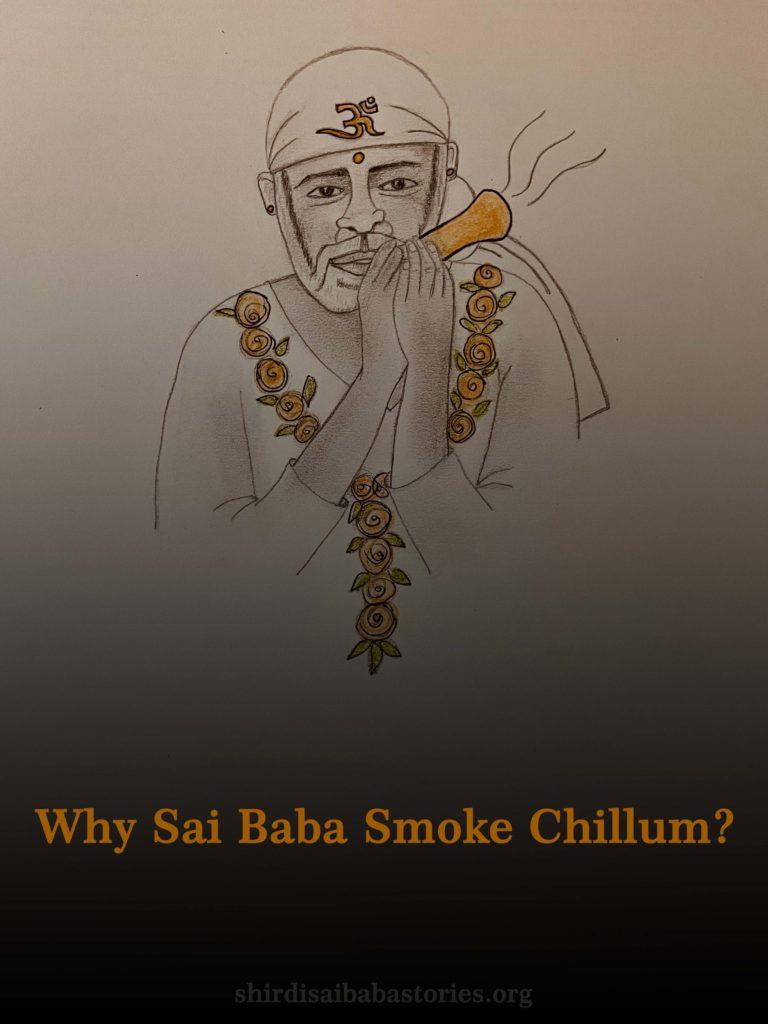
Introduction
Our previous post discussed the significance of repeatedly reading Sai Satcharitra. Through multiple readings, questions arise, and one such question is the topic of today’s post. Sai Satcharitra serves not only as a means to learn about the history and miracles of Sai Baba but also as a tool to understand Sai Baba and decode His timeless teachings.
Now, one might question whether blindly following Sai Baba, even if He smoked chillum, is appropriate. On the other hand, it is essential to acknowledge that Baba’s smoking of chillum was connected to His divinity. However, neither of these choices should be blindly accepted but in turn, taken as a means to understand the real nature of Sai Baba.
Ramakrishna Paramhans And His Love For Food
We would like to quote an incident about Ramkrishna Paramhans and His fondness for food, particularly Sandesh.
It is said that Ramkrishna had a deep interest in food, even to the point of obsession. This seemed quite unusual for a great saint like him, and it sometimes embarrassed his wife. During his satsangs with disciples, he would interrupt his teachings to inquire about the food being prepared in the kitchen. His closest disciples became concerned about this behavior and asked him to let go of this attachment.
However, Ramakrishna would only laugh and remain silent. When Maa Sharada insisted on knowing why he held onto this interest in food, he finally revealed the truth. He explained that his Prarabdha, his destined karma, had been completed, and he was holding onto this one attachment. If he were to let go of his interest in food, he knew he would pass away.
Though initially skeptical, later Maa Sharada witnessed the truth of his words. Three days before Ramakrishna’s MahaSamadhi, he turned away from his food, indicating that his time on Earth was about to end. He had clung to this attachment out of compassion, wanting to remain a little longer to guide and help those around him. His departure was a conscious choice, not bound by the usual laws of karma.
Understanding the actions of a Paramhansa, a realized soul, is a challenging task. They operate beyond ordinary human comprehension, having emptied themselves of accumulated karma. Just like a skilled physician can gauge the remaining time of a dying person by feeling their pulse, an enlightened being knows how much Prarabdha is left and when their time to depart has come. Ramkrishna, despite his attachment to food, had reached a state beyond ordinary gravitations, and his departure was a conscious and compassionate act.
Why Sai Baba Smoke Chillum?
By this reference, we hope that you can now understand what we are trying to decode and explain. Sai Baba is Parabrahm, which means He is beyond individual atman and has controlled and conquered His senses and inclinations. He attained Samadhi and was free from any bodily and worldly bondages. However, He chose to remain in bodily form with His devotees because He knew it was necessary at that time. A guide, a guru, was crucial to bridge the gap between religion and spirituality, as people had intertwined them based on their own views and opinions. So, Baba remained in the body to show the spiritual path to people, fulfilling their wishes, and encouraging them to focus on attaining liberation through a deep understanding of spirituality.
Similar to Ramkrishna Paramhans, Sai Baba kept His habit of smoking chillum. He had a stock of matchboxes and tobacco in Dwarkamai, as mentioned by Shri Rao Bahadur Moreshwar Parshan in the book “Glimpse of Indian Spirituality.”
Sai Baba’s act of smoking chillum might have appeared as an involvement, but in reality, He was indifferent to it. He remained available and accessible to devotees, allowing us to learn and understand His teachings passed down from the Vedas and Upanishads in a simple and practical manner. Living in Kaliyug (the age of Ajna or the age of darkness and strife), Baba knew that it wouldn’t be easy for people to comprehend and follow the principles of simple living written in the Vedas due to the layers of karma and overpowering intellect. Therefore, He chose to stay with us to help us face the challenges of Kaliyug, understand spiritual goals, and find the path from Kaliyug to SaiYug.
Now, this question arises as to why Baba took Samadhi for three days, where He went, what He did, and most importantly, why He returned. You can ponder this question and share your thoughts in the comments box below while we work on addressing this question in our next post.
Bhagavad Gita Quote
At the end of each post, we will conclude with a relevant Shloka from Bhagavad Gita and its meaning, to provide deeper insights and inspiration for our readers.

यस्त्विन्द्रियाणि मनसा नियम्यारभतेऽर्जुन | र्मेन्द्रियै: कर्मयोगमसक्त: स विशिष्यते || 7 ||
— Bhagavad Gita: Chapter 3 Verse 7
Transliteration: yas tvindriyāṇi manasā niyamyārabhate ’rjuna
karmendriyaiḥ karma-yogam asaktaḥ sa viśhiṣhyate
Translation Word by Word: yaḥ—who; tu—but; indriyāṇi—the senses; manasā—by the mind; niyamya—control; ārabhate—begins; arjuna—Arjun; karma-indriyaiḥ—by the working senses; karma-yogam—karm yog; asaktaḥ—without attachment; saḥ—they; viśhiṣhyate—are superior
Meaning: But those karm yogis who control their knowledge senses with the mind, O Arjun, and engage the working senses in working without attachment, are certainly superior.
Our Interpretation: In this verse, Lord Krishna explains the essence of Karma Yoga, the path of selfless action and service. He addresses Arjuna, who is confused and troubled about fulfilling his duties as a warrior in the great battle of Kurukshetra.
The verse emphasizes that a person who can control their senses through the power of the mind and performs their duties (karma) without any attachment to the results or fruits of those actions is truly exceptional. It highlights the importance of detachment from the outcomes of our actions while still fulfilling our responsibilities diligently.
It encourages individuals to act with selflessness, dedication, and a sense of duty, without being swayed by desires and personal gains. By doing so, one can attain inner peace, spiritual growth, and ultimately liberation (moksha).
More to Explore
© Shirdi Sai Baba Life Teachings and Stories – Member of SaiYugNetwork.com


